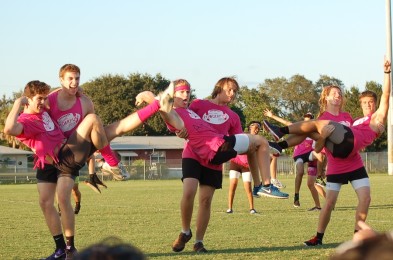Time for administration to face powderpuff music
The administration cut short the seniors’ powderpuff dance routine Thursday because the squad went off script.
“Please don’t stop the music.” — Rihanna
Three minutes into Thursday night’s Senior Powderpuff dance, the school’s administration did just that.
I have to wonder what exactly members of the administration were hoping to accomplish by cutting off the dance. If the goal was to affirm that West Shore will not accept lurid dancing as a form of entertainment then the administration really missed the mark. If the point was to send a message that our school will do everything in its power to crack down on the sexual stereotyping of women, then the message was not received.
Blaming Powderpuff for the presence of gender discrimination is comparable to arguing that video games or hip-hop music reinforce discriminatory attitudes. We seem to have forgotten that the media aren’t the cause of a discriminatory society, they simply reflect it. The fact that you can turn on the radio and hear a song that blatantly endorses rape culture isn’t a reinforcement of discriminatory behaviors. It’s a reminder that we live in a society in which artists know they can put out a song that glamorizes sexual violence without suffering anything more than a slap on the wrist. Sexual violence doesn’t prevail because of the entertainment industry or school activities, it prevails because we accept it.
Ignoring the problem of sexual discrimination in other aspects of our school and our community doesn’t help resolve the issue, it simply exacerbates it. Conversely, cutting off a dance certainly doesn’t send any message other than “we have the ability to affect positive change on the school but this is what we’ve decided to do with that power instead.”
If we really want West Shore to stand by its promise to provide a safe, fair environment for all its students, we have to view Powderpuff, as well other school events, not as potential problems but as platforms for positive, progressive change. I have a hard time believing that in a school that consistently ranks as one of the best in the country, the only solution that we can come up with to battle sexual stereotyping is cutting off a three-minute dance. And until we’re willing to rethink the way we address gender issues, the lines between appropriate and inappropriate behavior will remained blurred.


![Sophomore Isabelle Gaudry walks through the metal detector, monitored by School Resource Officer Valerie Butler, on Aug. 13. “I think [the students have] been adjusting really well," Butler said. "We've had no issues, no snafus. Everything's been running smoothly, and we've been getting kids to class on time.”](https://westshoreroar.com/wp-content/uploads/2025/08/IMG_9979-1200x800.jpg)







































